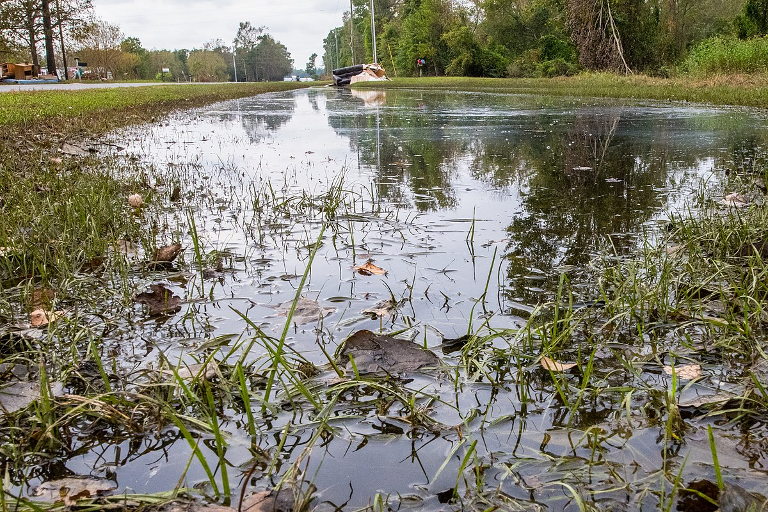North Carolina has committed to upholding the landmark Paris climate agreement by slashing greenhouse gas emissions, a move that comes a little over a month after Hurricane Florence devastated the state.
Gov. Roy Cooper (D) signed an executive order on Monday pledging to slash North Carolina’s greenhouse gas emissions 40 percent below 2005 levels by 2025. North Carolina joins 17 other governors who have signed onto the U.S. Climate Alliance, which commits states to upholding the Paris agreement, tracking and reporting their progress as they work to reduce carbon emissions.
“The state of North Carolina will support the 2015 Paris Agreement goals and honor the state’s commitments to the United States Climate Alliance,” reads Executive Order 80.
Last month, Hurricane Florence made landfall in North Carolina as an enormous Category 1 storm. Climate scientists have noted that warming ocean waters are increasingly allowing hurricanes to form quickly and head for land, only to stall and unleash a torrent of deadly rain — exactly as Florence did. As the state struggles to recover, officials are increasingly embracing conversations about climate change.
“A strong clean energy economy combats climate change while creating good jobs and a healthy environment,” said Cooper in a statement Monday accompanying North Carolina’s emissions target announcement. “With historic storms lashing our state, we must combat climate change, make our state more resilient and lessen the impact of future natural disasters.”
The executive order similarly draws the parallel between Florence and climate change. Referencing “the effects of more frequent and intense hurricanes, flooding, extreme temperatures, droughts, saltwater intrusion, and beach erosion,” the declaration notes that global warming is impacting the state’s economy to a severe extent.
Along with emissions reduction targets, the order calls for an increase in “ZEVs”, or zero-emission vehicles, saying the number of such registered vehicles should be “at least” 80,000 in the state. Moreover, the order calls for an energy use reduction of at least 40 percent per square foot from 2002-2003 levels in government-owned buildings.
Other components of the order include a call for the North Carolina Department of Transportation to develop a plan to accelerate the use of ZEVs and to prioritize them for government usage.
Cooper signed the order at the SAS Institute’s solar farm in Cary, North Carolina, a nod to the state’s rapidly-growing solar energy efforts. Under the new pledge, the North Carolina Department of Environmental Quality (DEQ) must develop a North Carolina Clean Energy Plan, one that will encourage wind energy along with solar, and highlight both energy efficiency and storage.
The North Carolina Department of Commerce will also be directed to support clean energy businesses and providers in their expansion efforts, and all state cabinet agencies must “integrate climate mitigation and resiliency planning into their policies, programs and operations.”
Environmental groups have greeted the move with enthusiasm.
“While the Trump administration denies and withdraws [from the Paris agreement], North Carolina has joined many other states and the rest of the world in taking on the crisis of climate change,” Derb Carter, the director of the Southern Environmental Law Center’s North Carolina offices, said in a statement. Carter commended Cooper for addressing “the biggest environmental challenge” facing the state.
“Moving swiftly to clean sources of energy, smarter transportation and development, and enhanced natural defenses will build a stronger and more resilient North Carolina while growing our economy,” Carter said.
North Carolina has historically taken a very different approach to global warming, once barring local governments from relying on climate science when regulating development in areas impacted by sea level rise, which is connected to climate change. While executive orders do not carry the same weight as laws, climate advocates indicated Monday’s order is still significant.
“These goals are not crazy environmental let’s-ban-stuff goals,” Stephen Kalland, executive director of the Clean Tech Center at North Carolina State University, toldthe News and Observer. “What was impressive to me was the scope of the announcement, how holistic it is.”
North Carolina’s decision reflects an ongoing trend across the country, as cities and states increasingly take the lead on climate action in the United States. Smaller-scale actions are also ramping up — last week, one of the most important transportation hubs in the country, the Port Authority of New York and New Jersey, declared its intent to sign on to the Paris agreement.
This all comes after a report from the U.N. Intergovernmental Panel on Climate Change (IPCC) released earlier this month warned that the world has a little over a decade left before crossing a dangerous global warming threshold.





